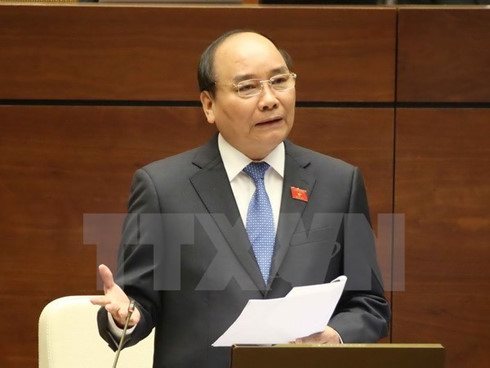Prime Minister takes floor at NA hearing
- Prime Minister appoints Commander of Mobile Police
- Prime Minister hails friendship association’s role in Vietnam-Thailand
- Prime Minister requests clarification on fish sauces' quality
More than 30 NA deputies raised questions to the Prime Minister, focusing on economic development, administrative reform, anti-corruption and Government construction.
The PM said with the resolve to build a constructive Government that serves people and businesses, the Government has drastically implemented the Resolution adopted at the 12th National Party Congress and the NA’s resolutions.
 |
| Prime Minister Nguyen Xuan Phuc |
Accordingly, efforts have been made to repairing limitations and weaknesses, removing difficulties and obstacles for production and business, and addressing pressing matters like drought, saltwater intrusion, environmental pollution, food safety, administrative reform, and social order and safety, he stressed.
Cabinet members have concentrated on enhancing the efficiency of management and governance, ensuring the efficiency of public spending, promoting thrifty practice in State agencies and society, fighting group interests, especially in equitisation and public investment, and curbing corruption, the leader said, noting that the Government has basically fulfilled its targets set in 2016 as reported to the legislature.
The Government will continue to implement socio-economic development tasks and solutions set for 2017 since the early days of the year in a comprehensive and drastic fashion, PM Phuc promised.
Responding to questions about anti-corruption and administrative discipline intensification, the PM laid special emphasis on the Government’s view of strictly punishing corrupt acts and other deeds that cause difficulties for people and businesses.
“The Government is resolved to eliminate depraved and degenerate officials,” he said, describing this as an urgent task for the entire political system.
He also underlined the need to complete institutions to ensure that no loophole is available for corrupt acts, increase administrative reform while promoting the involvement of the public, the press and the Vietnam Fatherland Front in the fight.
Regarding deputies’ concern about economic restructuring and bad debts, PM Phuc said bad debts have not yet been fully counted.
To deal with this tough issue, it is a must to build a better legal framework, especially for the operation of the Vietnam Asset Management Company (VAMA), while tightening control to keep the debts within the limit.
At the same time, weak credit organisations that were purchased by the State Bank of Vietnam at 0 VND should be put under special inspection, he said.
The Government is working on comprehensive solutions to reduce bad debts and will report them to the parliament, the leader said.
Asked about the Government’s view on the settlement of loss-making projects over the past time, PM Phuc affirmed that the Government will not use taxes collected from the public to cover losses of the enterprises.
The Government will try to cut losses through selling those enterprises or allowing them to go bankrupt, he said, pledging to ensure the State’s interests during the settlement process and clarify the responsibility of related organisations and individuals.
PM Phuc also said the equitisation of State-owned enterprises will be accelerated on the condition of ensuring State asset and transparency in the process.
He shared the view of NA deputy Do Thi Thu Hang from Dong Nai province on the significance of enhancing connectivity among SOEs and foreign-invested firms.
To ensure effective links, it is necessary to enhance domestic firms’ competitiveness and give priority to developing support industry, he said, adding that the selection of FDI projects should take into account whether the projects will assist local enterprises in expanding production.
Regarding orientations and measures to realise the target of 6.5-7 percent economic growth by 2020, ensure macro-economic stability and public debt safety, the PM admitted that it will be difficult to realise the set goal, but it must be done to ensure job and resources to address the burden of public debt.
Agreeing with deputies Tran Hoang Ngan and Truong Trong Nghia’s opinion on the importance of a self-control economy in the context of integration, the PM stressed the need to build an economy that does not depend on global market fluctuations, especially in energy and food.
Towards this aim, the country should develop its fields of strength such as organic agriculture and IT, while expanding market, encouraging and supporting development of private economic groups, he noted.
The PM also said agriculture is an advantage of Vietnam and restructuring agriculture calls for the application of advanced technologies, changes to land use rules, and the development of trade and services for agricultural products, among others.
Sharing concern over the efficiency of climate change adaptation raised by deputy Vo Thi Nhu Hoa from Da Nang, the PM said the Government has issued a plan of actions, prepared funding and assigned specific tasks to ministries, sectors and localities in this field.
The Government and localities have also mobilised resources and assistance from many international organisations for solving the issues, he added.
Summing up the Q&A session, NA Chairwoman Nguyen Thi Kim Ngan said the hearings took place in a democratic and constructive manner.
Ttotal of over 200 NA deputies put questions at the session, including over 20 addressed to the Prime Minister.
Cabinet members have demonstrated that they thoroughly understand the fields under their charge and did their best to give full and straightforward answers to questions.
The NA Chairwoman asked the Government to devise specific measures to implement the legislative body’s requirements at the session.

